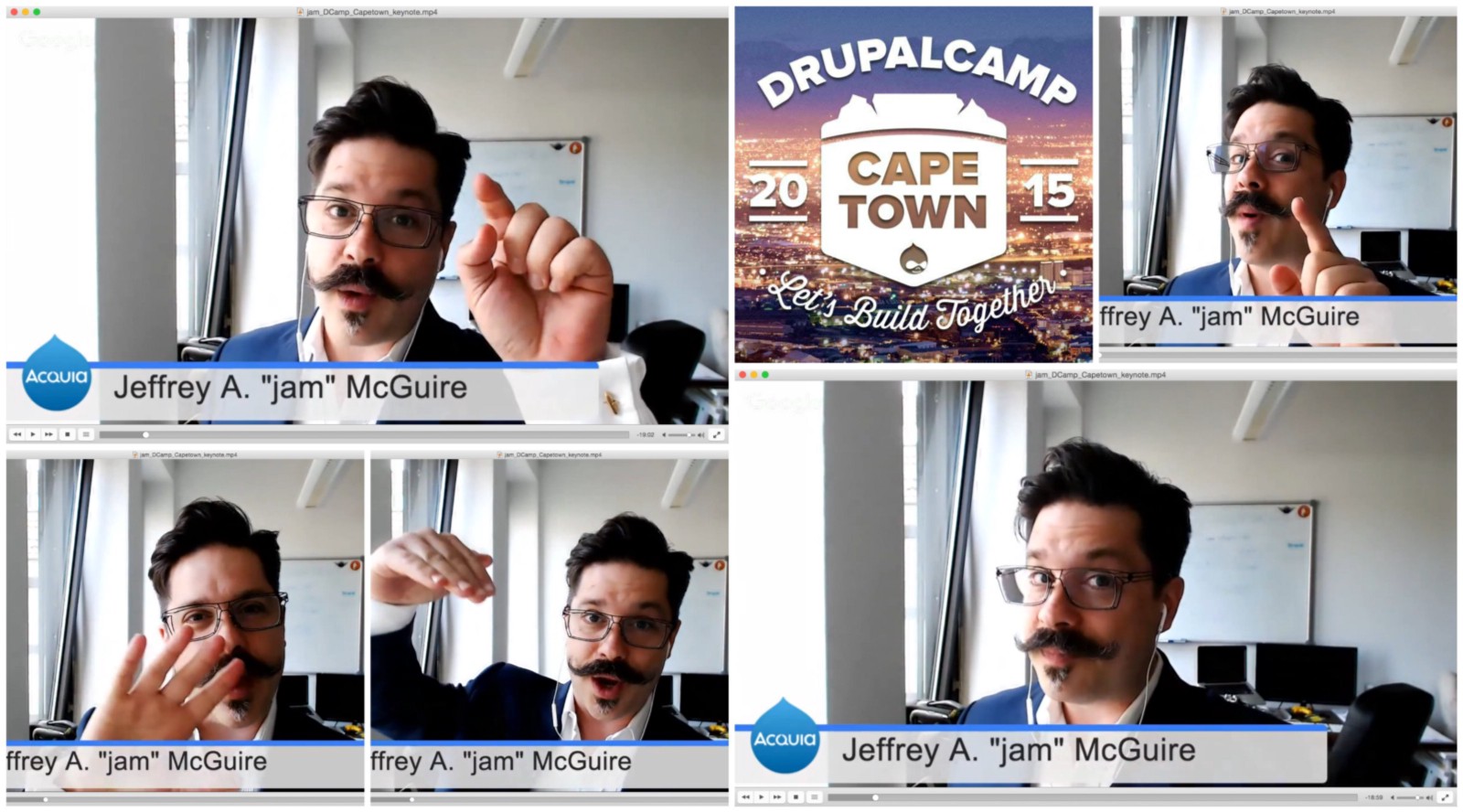My virtual, mini-keynote at Drupal Camp Cape Town 2015. This is a short talk that includes ideas from the “Idealism as Code” presentations that I’ve given at a few events in recent months. Watch the video (below) to see the slides I refer to.
I was thrilled to be invited to give the keynote address at Drupal Camp Cape Town 2015, the first-ever South African Drupal Camp. Since I couldn’t make it down there in person — I want to be there next time! — we set up a live video connection for my session and limited it to about 15 minutes. Once we got some technical difficulties out of the way, the connection via Google Hangout on Air was great and I was even able to hear the audience reacting to me. If you’ve ever done a presentation without any live audience feedback, you know it can be tough. Dear Cape Town Drupalists, thanks for laughing at the right times!
Watch the video of my session to see the presentation slides and learn more about the Four Freedoms that define open source software
- a comparison of working with proprietary v open source software
- DRM (digital rights/restrictions management), digital locks, and transparency in the era of the Internet of Things
- the power of owning your software
- trust v openness and accountability in systems of record
- and more!
Video of my virtual keynote at Drupal Camp Capetown, 2015
##Idealism as Code I see open source software — Drupal perhaps especially — in a tradition of idealism and idealistic communities; communities driven by ideals to effect real-world change. We’re in an amazing position now as Drupalists to effect real-world change with technology. We’ve built powerful tools for digital communication, but this comes with responsibilities, too.
We are the empowered practitioners who are building the web and building the next generation of digital, interconnected technology. We can build our products and projects in ways that empower us all. And we are privileged, we’re the gatekeepers and controllers of technology. We should always strive to build safe and secure applications by default. We shouldn’t make things ugly and hard to use. And our project — Drupal — is very good at empowering less-technical users. Even more importantly: Digital rights are human rights in this day in age and we have an opportunity and a responsibility to enable others, less technical than ourselves, to enjoy freedom, privacy, and security.
“Digital rights are human rights in this day in age and we have an opportunity and a responsibility to enable others, less technical than ourselves, to enjoy freedom, privacy, and security.” — Jeffrey A. “jam” McGuire, 2014
##Successful open source I want you to be successful at free/libre open source software. That means building safe and secure applications that maintain our privacy and our freedom. And they need to be compelling. We’re living in the iPhone age; we’re living in the world where beautiful, fantastic digital experiences are available to all, and very cheaply. We have to build those, too. Let’s keep that in mind. They — your sites and applications — should empower people to do good, to do well, to realize their own visions. That’s what we’re here for.
To be “successful,” in my opinion, open source projects and products need to be all of the following:
- Safe by default
- Secure by default
- Compelling by default
- Empowering by default
##Drupal’s fundamental design decision: empowerment Speaking of empowerment, I recorded a podcast at the United Nations (here and here) with Angie Byron in 2014. She made a great point about technology and empowerment:
“We [as Drupalists] make really abstract, complicated programming concepts accessible to non-developers … Available to them by clicking a few buttons without having to understand all the code that comes underneath it. What I get excited about is the idea that we create really easily accessible things to help those people who are on the front lines, trying to make the world a better place. We can build technology to enable that.” — Angie Byron, 2014
##Four freedoms that drive innovation (and more) Four idealistic concepts underpin everything that open source is about. They are the so-called “Four Freedoms”:
- Use it: for anything, anywhere, forever (You’re free to use this stuff for any reason. Nobody can take it away.)
- Study it: understand what you are using (You’re free to understand it. Mitigate risk, by knowing it does what it says on the box.)
- Modify it: fix it, make it better (You are free to change it and make it exactly the tool you or your clients need.)
- Share it: redistribute, sell, give back (You are free to pass on your changes.)
Each of the freedoms multiplies the others. They form a virtuous circle and produce great software, powered by incredible communities of smart motivated people around the world. We empower each other. Every time you fix a bug it’s also fixed for me. Every time I write an improvement to your module it’s also available to everyone else and by sharing all this, we become an incredibly powerful organism and an incredibly powerful force for good.
People building the tools that they use themselves are incredible forces for innovation because we know exactly what we need and we don’t have to wait for someone else to build it for us.
“Users generally have a much more accurate and detailed model of their needs than manufacturers have.” — Eric von Hipple, Democratizing Innovation, 2005
The result? There are around 30,000 active Drupal developers 100,000+ active users on Drupal.org and literally millions of people in the world who touch Drupal every day. It’s incredibly exciting to me.
##In conclusion I really encourage you to remember the incredibly privileged position that we’re in as technically capable people and that we need to help everyone else out. Drupal is a great place to give that kind of help. Please build safe, secure, compelling, and empowering applications by default.
##Presentation Slides
Originally published on Acquia.com
comments powered by Disqus
